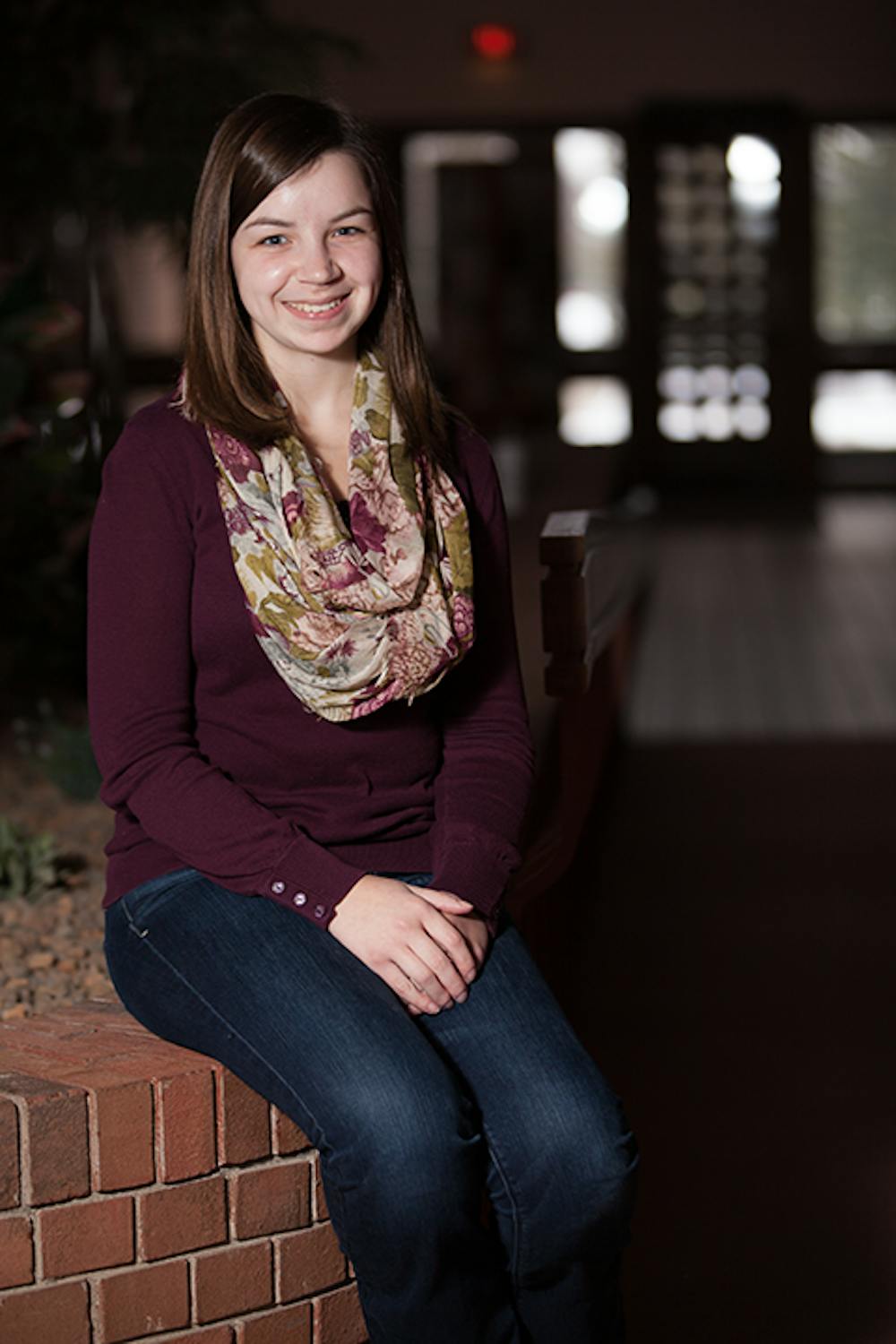By Kari Travis
The alarm clock sounds at 6:30 a.m., and junior Alison Tews awakens to face a new day. She's hesitant to roll out of bed, but this has little to do with sleepy procrastination.
It has everything to do with the sharp pain in her neck, in her shoulders and in her legs.
Alison wishes she could avoid the pain and go back to sleep, but the snooze button is not an option. She has to go to class.
Forcing her body into a seated position, Alison breathes slowly and deeply until her body adjusts to the constant, stabbing sensations. As she slides onto the floor and stands on joints that grate with every motion, Alison sucks in another mouthful of air to keep from groaning.
The day is just beginning, and pain will underscore every part of it. This is every day life for Alison, an elementary education major with rheumatoid arthritis (RA).
"Emotionally, socially dealing with this disease has been a learning process," Alison says. "At times, it is true that I want people to acknowledge this is hard, but I don't deserve any credit, only God does,"
Alison's struggle with RA wasn't anticipated. Early on, it was almost undetectable. The warning signs, beginning in sixth grade, came in the form of painful twinges in Alison's neck and jaw. It wasn't until several years later that the disease put Alison's body under full attack.
During her junior year in high school, the pain turned to swelling. When Alison woke one day in too much pain to move, her parents decided it was time to seek medical help.
"For a few weeks, doctors couldn't figure out what was wrong, but because of the damage in my jaw they sent me to a rheumatologist. I was officially diagnosed a month before my 17th birthday."
The diagnosis meant that Alison joined almost 300,000 other juvenile victims of RA in the U.S., according to a Cleveland Clinic study.
To Alison, life with RA meant three, simple things: Life was exhausting. Life was painful. Life was beyond control.
Her days were suddenly polluted with prescription medications, shots and therapies. Swelling in her hands and fingers made it impossible to take notes in her high school classes. Physical strain and faulty concentration complicated exams and homework.
And that was only the surface level of Alison's struggle. The emotional exhaustion that followed treatments made sudden flare-ups and bouts with illness common and difficult to handle.
When Alison realized life with RA was permanent, she began learning how to cope. She learned how to deal with doctors, how to ask for the right medicine and how to objectively monitor her health.The only thing she couldn't learn was how to help people understand her struggle.
"Some people will ask what is wrong, hear the word 'arthritis,' and move on without listening to the part that it is a chronic, progressive disease that affects my whole body all the time," she explains, as she pulls a cardigan over her shoulders.
Her mouth is pinched at the corners; her eyes are constricted with pain. It's 6:43. She'll go to breakfast in 32 minutes.
"I realize people rarely understand the depths of the impact of this disease, and some people really don't know what questions to ask, but I can tell when someone is at least trying to understand."
People often don't respond to her condition because they don't know how, Alison says, smiling and shaking her head. Sometimes, Alison's symptoms and treatments evolve so quickly even she doesn't know how to handle the illness.
Friends who admit they don't have the answers are often the most comforting. The simplest gestures serve to brighten her day and help her cope effectively.
"Some days, I need motivation to keep pushing on through classes, sometimes I need people to tell me that it really is okay to take a break and take care of myself even when I have commitments I feel I can't miss . . . mostly my friends have been helpful through encouragement."
Similar support systems have especially helped here at Taylor, where new challenges present themselves each day. The most prevalent challenge is extra physical stress.
"When I get sick with a really bad cough or wake up and suddenly can't put any weight on my foot, it is really easy to get extremely frustrated or overwhelmed," Alison says. "Even if these new issues have come up in the past, having something new added on physically and emotionally easily pushes me over the edge."
The clock now reads 7:00, and Alison is brushing her straight brown hair. It's a slow process. She can only bend her hand halfway around the brush. When she's finished, she pulls the top half of her hair back in a clip. A long, faint scar is visible high on her neck.
Jaw replacement surgery has a way of leaving its mark.
"Some would call the surgery a success, I'm not sure if I would, but we didn't exactly know what to expect," Alison explains as she gathers an iPad and some folders into her book bag.
"Compared to before, my jaw definitely hurts less . . . when I am eating something hard or big, or when I am talking for a really long time."
It's 7:15. Time for her to go. Alison pulls on her coat, and stops a moment to adjust to the pain before picking up her bag. She opens her door, but hesitates long enough to say one more thing before heading out.
"The strength and determination and joy I sometimes have comes from God and the Holy Spirit working in my life," Alison concludes. "If God can be glorified through my disease, it is all worth it."





